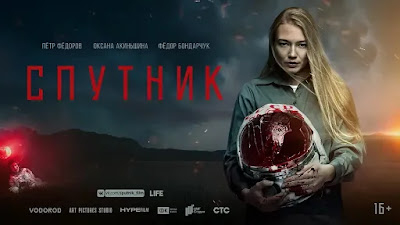by Ben Soton
Sputnik (2020). Director: Egor Abramenko; Writers: Oleg Malovichko, Andrey Zolotarev; Stars: Oksana Akinshina, Fedor Bondarchuk, Pyotr Fyodorov. 113 minutes. Classification age 15.
Is this first-time director Egor Abramenko’s take on the former Soviet Union? Does it reflect the views of the Putin government or is it just plain science fiction?
Whatever the reason, Sputnik, a film sponsored by the Russian Ministry of Culture, was a blockbuster when it was released in Russia last year.
The film is set in 1983, just before the treacherous Gorbachov regime began a policy of internal destruction that they called glasnost (openness) and perestroika (restructuring). The film is part science fiction, part political thriller and even part horror. As the film reaches its climax however, it contains an element that is deeply and perhaps uniquely Russian.
The story revolves around a Soviet cosmonaut, Konstantin Veshnyakov (played by Pyotr Fyodorov), who returns to Earth with a dead crew and his body inhabited by an alien life form. For reasons of safety and public morale the cosmonaut is kept in the launch site in Kazakhstan. Meanwhile a doctor, Tatyana Klimova (played by Oksana Akinshina), is sent to remove the alien from his body.
Klimova is portrayed as a maverick who thinks outside the box, whist the Soviet Union is portrayed as rigid and hostile to change. On the other hand, the Soviet Union in the form of Colonel Smiradov, the base commander (played by Fedor Bondarchuk), needs people like Klimova to deal with an unorthodox situation. This was the argument put forward by those who supported glasnost and perestroika. This was not to say that the problems faced by the 1980s Soviet Union did not require thinking outside the box; this did not, however, justify the Gorbachov clique destroying the box and selling off its remaining contents.
Early scenes in the film depict the boredom of space travel; so different from the excitement of Star Wars and Star Trek. But there are some nods towards the Hollywood SF genre. For a start, there is a similarity with Alien, Ridley Scott’s 1979 film, whilst the creature inhabiting Veshnyakov’s body is remarkably similar to the hostile planet-consuming aliens of Independence Day. But Klimova, using science to remove a bestial creature from the body of an otherwise healthy man, makes Sputnik a more complex story than Alien and its spin-offs.
With much of the film focused on the relationship between Veshnyakov and Klimova, parallels emerge with Beauty and the Beast, the French fairy tale which has travelled the world like the original Sputnik, the first satellite in space.
It is said that the Soviets cut corners with their space programme and other areas of national security; however, the Soviet Union never saw a single day of peace in its 70-year lifespan. It faced aggression from its foundation in the form of imperialist intervention. In the Second World War the Red Army beat back and eventually crushed the Nazi hordes, and during the Cold War the Soviet Union was forced to spend considerable resources on nuclear weapons. Despite this, its achievements were enormous: the elimination of poverty; racial and gender equality; its assistance to the anti-imperialist struggle. The USSR achieved great feats in science, education and the arts, and its victories after the Second World War benefitted many beyond its borders – including this country. It is to the Soviet Union that we owe the National Health Service. With this in mind, the Soviet Union and its pioneering ventures into space need to be remembered – but not in this way!
Nevertheless, it’s well worth watching if you’re into the SF scene. The film is available on DVD and on streaming video platforms, including Amazon Prime and Netflix.

No comments:
Post a Comment